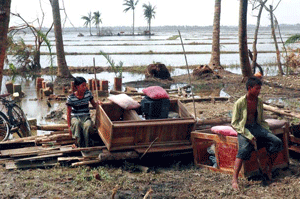BRIEFLY NOTED (March 2010)
(Page 2 of 3)
Burmese-American Activist Jailed by Rangoon Court
A court in Rangoon’s Insein Prison sentenced Burmese-American activist Nyi Nyi Aung to three years imprisonment in February. Nyi Nyi Aung, 40, was sentenced under Article 468 of the Penal Code for possessing a fake Burmese ID card, and Article 24/1 of the Foreign Exchange Regulation Act for illegal possession of a foreign currency. He was also found guilty of failing to renounce his Burmese citizenship. Nyi Nyi Aung was arrested by Burmese authorities on Sept. 3, 2009, after arriving at Rangoon’s international airport on a flight from Bangkok. A political refugee who resettled in the US in 1993, he returned to Burma to visit his mother, who is a political prisoner. After sentencing, he was transferred to prison in Prome, Pegu Division.
Burmese TV Provider Drops CNN
Burma’s only provider of non-state television, MRTV-4, has stopped broadcasting the US-based news network CNN. Sources in Rangoon said MRTV-4 dropped CNN after Ministry of Information officials complained that the network’s coverage of international humanitarian efforts in Haiti featured too many images of US troops. Until it was cut completely on Feb. 1, CNN was aired in Burma with a 20-30 minute delay to allow censors to remove Burma-related reports or any other international coverage deemed sensitive by the country’s ruling junta. Since coming under heavy criticism for its response to Cyclone Nargis in May 2008, the regime has been wary of reporting on similar disasters elsewhere in the world, particularly in cases where the US military has played a major role in providing relief. Only after UN Secretary-General Ban Ki-moon personally interceded at the end of May 2008 did the regime allow international nongovernmental organizations to provide limited assistance in the cyclone-stricken Irrawaddy delta.
Filipinos to Vote in Automated Elections
Filipinos will vote in the May 10 general election through an “automated elections system,” which promises to speed up time spent at the ballot box, a quicker results count and a supposedly fraud-free process. Comelec, the country’s election authority, has purchased 82,000 precinct-count optical scanner (PCOS) machines in a move to finally automate election procedures and eradicate cheating. But with the Philippines’ history of violent and fraud-tainted elections, where ballot boxes can be snatched in broad daylight and votes can be padded or shaved to favor candidates, critics are wary that the high-tech system can still be misused by politicians.
Half a Million Still Homeless in Delta
 |
| Survivors of Cyclone Nargis cling to their few remaining possessions in the aftermath of the disaster. (Photo: Getty Images) |
IOM spokesman Chris Lom says the affected people have not been able to buy supplies to rebuild their houses because they need to spend the money on food. He says the agency’s reconstruction program in the Irrawaddy delta is running out of money. IOM has appealed for US $17 million to give basic shelter to about 250,000 people in the region. He said other aid agencies are trying to set up shelter for the rest of the homeless. Cyclone Nargis killed nearly 140,000 people in May 2008 and left some 2.4 million without a home.
110 Journalists Killed in 2009
The toll of journalists killed while covering stories worldwide hit 110 in 2009, making it the deadliest year in a decade for the profession, the International Press Institute (IPI) said in its annual “World Press Freedom Review.” Half the deaths—55—occurred in Asia, followed by Latin America, where 28 journalists died.
« previous 1 | 2 | 3 next page »
